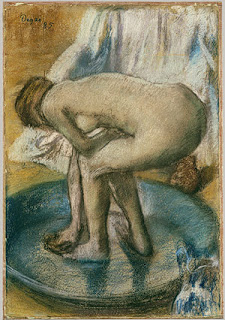Read for Kundiman, at Verlaine , on Sun, Feb 17, with Jennifer Kwon Dobbs. Sold two copies of my chapbook. Joseph and Sarah, the people running Kundiman, gave me a present of Chinese black tea, a shimmering pearly bowl, and Ashbery's Where Shall I wander . Read there , in New Jersey, last Tuesday, for an event billed as "In and Out of Love," with Melissa, who is lesbian. A good friend, Chloe, who teaches Comp and Creative Writing at the University, organized the reading. She has an office in the Mansion, a stately home converted to school use. The reading took place in the Orangerie in the library, a big high-ceilinged room, with lovely tall windows. David Daniel, the Director of the BA Creative Writing program was there as well, as were about fifteen undergraduate students. After our readings, we fielded questions. How do you balance job and writing? Where do you get your inspiration from, personal experience? Do you find it difficult to read something intensely personal...




